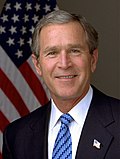Implementation
The act was implemented by President George W. Bush's Executive Order 13456 on January 23, 2008. [1] The Act addresses many of the issues that have been the focus of concern since the 2005 report: it establishes transaction-specific and general Congressional notification requirements, creates rules that dictate how applications before CFIUS may be withdrawn, and specifically includes energy supplies among critical US assets requiring special consideration. More generally, the bill establishes more stringent rules for the review and formal investigation of transactions, especially those involving foreign governments or critical infrastructure assets. It also requires senior-level involvement in various required certifications and reports, limiting the agencies' delegation authority. In general, then, the bill's provisions convey the seriousness with which Congress expects the CFIUS agencies to approach future reviews.
Key Provisions
The bill's key provisions are as follows:
• The bill establishes the membership of CFIUS by statute, and creates a defined role for the Director of National Intelligence as an ex officio member who must evaluate the transaction's national security implications.
• On each future transaction, one of the member agencies would play a lead role, in addition to Treasury, depending on the transaction's subject matter. The lead agency would be responsible for negotiating and overseeing mitigation agreements.
• Transactions that involve foreign governments, a threat to national security, or control of critical infrastructure must be subject to a 45-day formal investigation, except that exceptions are possible for foreign government transactions if the Secretary or Deputy Secretary of Treasury and the lead agency certify that there is no national security threat.
• The bill requires sign-off at the assistant secretary level (or above) that a transaction does not fall into one of these categories and need not go beyond the 30-day review period. Similar sign-off is required at the close of the 45-day investigation period to confirm that the transaction does not threaten national security.
• CFIUS must report to Congress at the end of reviews and formal investigations. The bill also requires annual reports to Congress on the activities of CFIUS.
• The bill provides explicit authority to CFIUS to require mitigation agreements.
• Among the factors CFIUS must consider in its review are the impact of the transaction on critical infrastructure, broadly defined, as well as energy assets and critical technologies. In the case of foreign-government transactions, CFIUS must also consider the relevant country's compliance with US and multilateral counter-terrorism, non-proliferation, and export control regimes.
• The bill creates specific authority for CFIUS to enforce mitigation agreements. Further, it explicitly establishes CFIUS's "evergreen" authority to reopen a transaction that has been approved if there has been an intentional breach, and no other remedies will suffice.
The bill also requires the publication of regulations that will standardize the filing process, as well as the process by which CFIUS communicates results to parties. And it requires CFIUS to publish guidelines concerning the types of transactions that have presented national security considerations, which could be helpful for companies trying to determine whether to make the so-called "voluntary" filing decision, especially now that withdrawals will be more closely regulated.
This page is based on this
Wikipedia article Text is available under the
CC BY-SA 4.0 license; additional terms may apply.
Images, videos and audio are available under their respective licenses.


